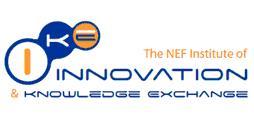A celebration of innovation at the NEF IKE launch

The worlds of education, invention, business and industry came together at the recent launch of the NEF Institute of Innovation and Knowledge Exchange (IKE), an institution that aims to drive Innovation in Further and Higher Education, Business, Industry and Government.
A glistening array of speakers from across sectors and countries joined Professor Sa’ad Medhat, CEO of IKE, to deliver speeches that stimulated the mind and challenged the status quo. Dr Rosie Bryson, Chair of IKE and Development Manager at BASF Plc identified that nature often holds the key to problems we face. Detailing how a little fungus found in pine forests led to innovations that increased corn maize yields by up to 40%. Dr Bryson added that’ innovations don’t just happen, they come from something else, you have to look at things from a different perspective, take the knowledge from the customers, from nature, from colleagues and build upon this – but innovation is essential, for without it, we wouldn’t survive.’
Mark Young, EMEA Marketing Manager at DuPont, echoed Dr Bryson in saying that ‘innovation is at the cross-over point between disciplines, sectors and companies; it is there that innovative ideas emerge. Our planet’s population is increasing – 9 billion by 2050; the problems such as food security, energy security and health protection are massive. Collaboration, even between competitors is the only way to solve these problems – great things happen when we all work together’.
Professor Mario Cardullo, Chairman Cardullo Innovations Group, inventor of the RFID and former US Councillor and Technology Innovation Adviser flew in from Washington DC to deliver his speech about innovation, technology and venture capital. In his words, ‘only 1 in 5,000 new business plans invested in produce ‘star products’, but failure is something the world’s biggest entrepreneurs have had to face, and as result have grown better’. Professor Cardullo added, ‘we shouldn’t be afraid of failure, we shouldn’t penalise failure, we should embrace it, for only then can we really appreciate what innovation is all about.’
An amazing insight into the Cloud was provide by Dr Rob Fraser, Chief Technology Officer, Microsoft, who showed that the Cloud was levelling the playing fields across the world, and that organisations of any size were accessing computing power, applications and services that were formerly the sole preserve of giants. Providing computing power on a massive scale – Dr Fraser said ‘petabytes were thrown around like before megabytes had been.’ Don’t know what a petabyte is – Dr Fraser helped the audience to visualise: ‘image a stack of CDs stacked 2.5 kilometres high – that’s a petabyte!’ Cloud computing makes the internet of things, the devices we connect to in our everyday lives, come alive with opportunities to enable innovation.
As devices become more intelligent and software ‘mash-ups’ become common place, devices will be able to communicate in real time to provide solutions for everyday travel. Rob added, ‘I’m still waiting for tube trains to communicate the number of passengers and their destinations, so that one train stays on the platform for an extra 10 seconds to allow passengers to change trains – intelligent travel around London – that would be an innovation!’
Mark Champkins, Founder of Concentrate, Inventor in Residence at the Science Museum, and winner of Peter Jones’ support in the Dragon’s Den, wowed the audience with his range of innovative products to help children concentrate, including a water bottle cover that doubled as a pencil case. Although, the way in which he broke into the mainstream retail was an innovation in itself. Mark explained that ‘by placing his products on store shelves next to bottled water, he was able to create the vision for the buyer as to how point of sale would look’. A risky strategy that involved ‘running the gauntlet of the guards’ as Mark put it, but through persistence and some 274 emails later, Concentrate broke into John Lewis, and is now selling its range of products.
Prof Medhat summed up the feeling of the evening: ‘innovation requires investment, by governments, organisations and individuals, and only by investment in both the tangible – the buildings, infrastructure and equipment, and the intangible – the education, skills and talent development, we can really achieve wealth creation and greater social wellbeing for all.”
For more information on IKE, please visit theike.org.
Feature supplied by the New Engineering Foundation






Responses